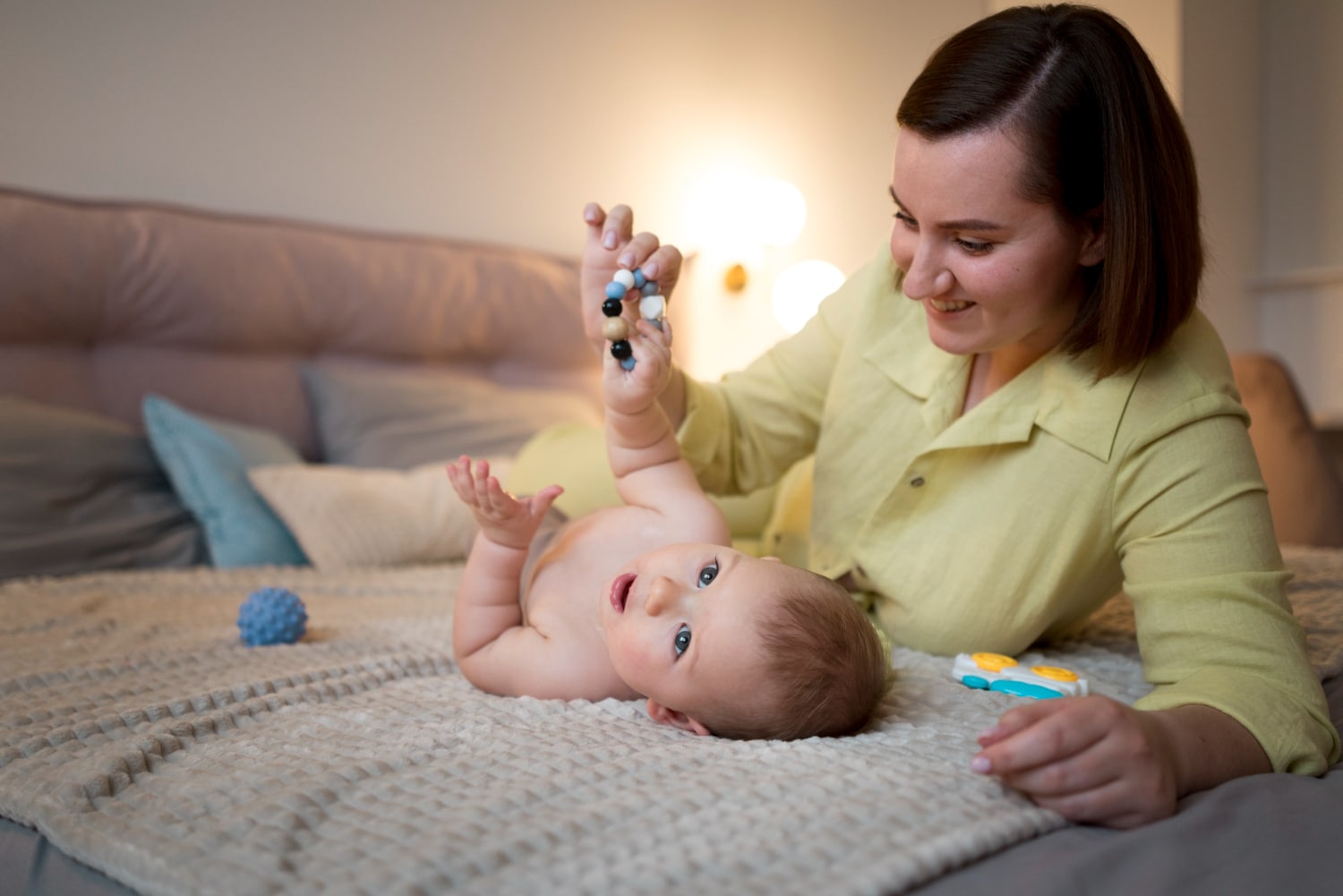
Why Sleep Is Critical for Infant Brain Development
Sleep might feel like a luxury in your household these days, especially if you’re adjusting to life with a newborn. But while you’re measuring your sleep in snatched hours and lukewarm cups of tea, your baby’s brain is undergoing something remarkable — rapid, essential growth fuelled by rest.
We often think of sleep as downtime, but for infants, it’s anything but. Sleep is a time of intense brain activity, where key developmental processes unfold — building the very foundation for learning, memory, emotional regulation, and sensory processing.
In this guide, you’ll discover how baby sleep supports brain development, the newborn sleep benefits that truly matter, and what role rest plays in infant cognitive development. Backed by scientific insights and explained in a relatable, parent-friendly way, this post will empower you to view your baby’s snooze time as one of their most important developmental tools.
Let’s explore why good sleep today can mean a brighter, stronger brain tomorrow.
The Link Between Sleep and Baby Brain Growth

A Time of Rapid Change
During the first year of life, your baby’s brain doubles in size. According to the Centre on the Developing Child at Harvard University, more than 1 million new neural connections form every second in a baby’s brain during this period. Much of this brain-building happens while your baby sleeps.
The Role of REM Sleep
REM (rapid eye movement) sleep — also called active sleep in infants — dominates the early months. During REM, the brain is highly active, and this is when:
- Neural pathways strengthen
- Memories consolidate
- Sensory information is processed
- Emotional regulation begins
For newborns, up to 50% of total sleep is REM, compared to just 20–25% in adults. That’s no accident. It reflects just how crucial this stage is for your baby’s cognitive and emotional development.
Key Benefits of Sleep for Infant Brain Development
1. Formation of Neural Connections
Sleep supports the creation of synapses — the connections between neurons that enable learning. Every time your baby sees a face, hears a voice, or feels a texture, their brain records that information. But it’s during sleep that these experiences are cemented into memory.
2. Language Development
You might not expect a baby who doesn’t speak to be working on language, but that’s exactly what’s happening. Studies show that infants exposed to speech during the day are better able to retain language patterns if they get sufficient sleep afterwards.
3. Emotional Regulation
Babies who nap well tend to be more settled, and that’s not a coincidence. Sleep helps regulate cortisol, the body’s stress hormone. Over time, this supports emotional resilience and reduces the likelihood of frequent meltdowns.
4. Improved Attention and Learning

Just like adults, babies perform better when they’re well-rested. Babies who get adequate sleep show more focused attention, better problem-solving, and improved learning abilities — even in infancy.
What Science Says: Research on Infant Sleep and Brain Development
Several credible studies back up what many parents instinctively feel — that sleep is vital for growth.
- A 2013 study published in Proceedings of the National Academy of Sciences found that infants who napped after learning had stronger memory recall than those who didn’t.
- The American Academy of Pediatrics notes that infants with irregular or insufficient sleep patterns are more likely to experience cognitive and behavioural difficulties later in childhood.
- MRI scans of sleeping infants show increased brain plasticity during naps, especially in regions tied to sensory processing and memory.
Sleep isn’t just rest — it’s a vital form of brain nourishment.
How Much Sleep Does a Baby Actually Need?
Newborn sleep needs change rapidly as they grow. While it may feel all over the place, there are patterns you can look for:
| Age | Total Sleep (per 24 hrs) | Night Sleep | Naps |
| 0–3 months | 14–17 hours | 8–9 hrs | 4–5 |
| 4–6 months | 14–15 hours | 10–11 hrs | 3–4 |
| 7–12 months | 13–14 hours | 11–12 hrs | 2–3 |
The key here isn’t perfection — it’s consistency and restorative quality.
What Happens When Babies Don’t Get Enough Sleep?
Just like adults, sleep-deprived babies feel the impact, sometimes in subtle ways, sometimes more obviously.
Signs of Sleep Deficiency in Babies
- Fussiness and irritability
- Poor feeding patterns
- Difficulty settling for naps
- Short attention spans (for their age)
- Developmental delays over time
Long-term sleep deprivation in infants can also affect memory retention, language acquisition, and even emotional bonding.
Supporting Brain Development Through Better Sleep
You can’t control every minute of your baby’s sleep — nor should you try. But you can create an environment that supports healthy, brain-building rest.
1. Build a Consistent Sleep Routine
Predictable routines give your baby’s brain powerful cues that it’s time to rest. This reduces stress and encourages smoother transitions into sleep.
A calming bedtime might include:
- Warm bath
- Quiet cuddle time
- Reading a short book
- Dim lights and soft white noise
You’ll find more ideas in our guide to creating a consistent bedtime routine for newborns.
2. Protect Nap Times

Daytime sleep is just as important as night-time sleep for cognitive growth. Keep a close eye on wake windows and sleep cues like rubbing eyes, yawning, or fussing.
Learn more about wake windows in our guide on baby sleep timing made easy.
3. Use Light to Support Natural Sleep Hormones
Light exposure helps regulate melatonin, the sleep hormone. In the morning, ensure your baby gets natural daylight. At night, minimise exposure to bright screens or harsh lighting.
4. Provide a Safe, Peaceful Sleep Environment
- Keep the room quiet, dark, and cool (around 16–20°C)
- Use blackout curtains if needed
- Consider white noise to mask environmental sounds
- Avoid toys, mobiles, and distractions during sleep.
Real-Life Story: Jonah’s Sleep Transformation
Jonah, a 4-month-old baby, was only sleeping in 20–30-minute bursts and waking frequently overnight. His parents, Laura and James, were exhausted and concerned. After a visit to their paediatrician, they learned about the link between newborn sleep and brain development and decided to make some changes.
They introduced a consistent bedtime routine, used blackout blinds, and limited stimulation in the hour before bed. Within a week, Jonah started sleeping longer stretches and became noticeably calmer and more alert during the day.
Laura shared, “Once we saw how much better he was during wake time, we realised just how important his sleep really was.”
The Brain’s Best Work Happens During Sleep
As you rock, feed, and soothe your baby through those early months, remember this: behind closed eyelids, your little one’s brain is busy building a foundation for their entire future.
Baby brain growth during sleep isn’t a luxury — it’s a necessity. Every hour of quality sleep supports newborn cognitive development, emotional balance, and learning capacity. It’s the ultimate multitasker — nurturing, developing, and healing all at once.
Your job isn’t to get everything perfect. It’s to tune into your baby’s cues, provide a nurturing sleep environment, and be patient through the process.
Have questions or your own sleep insights to share? Leave a comment below, share this with a fellow parent, or subscribe for more expert-backed tips on infant development and well-being.


